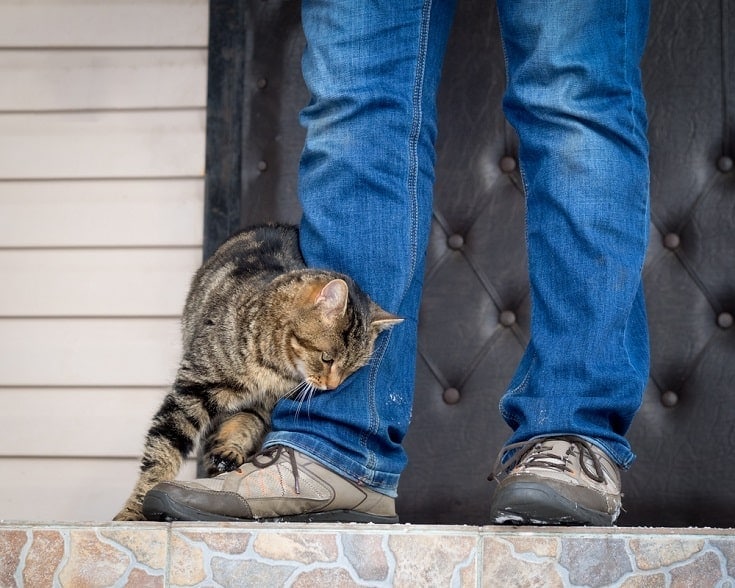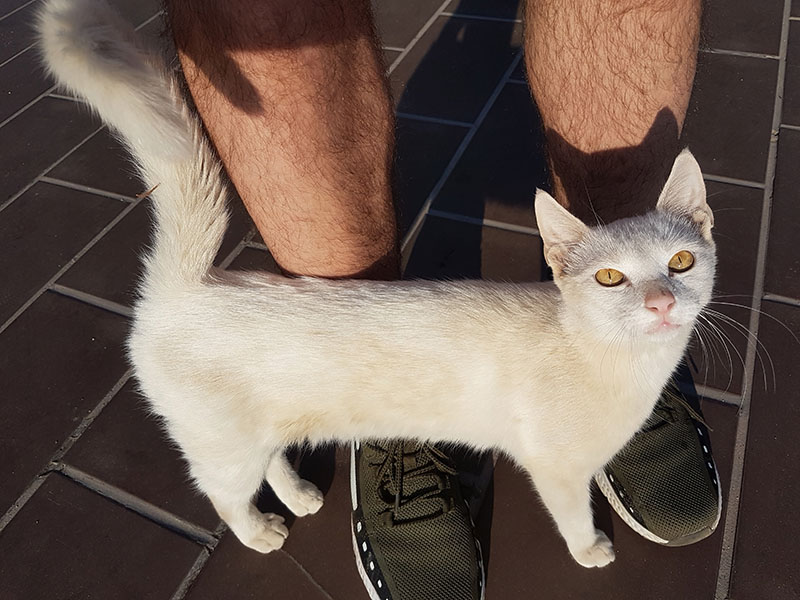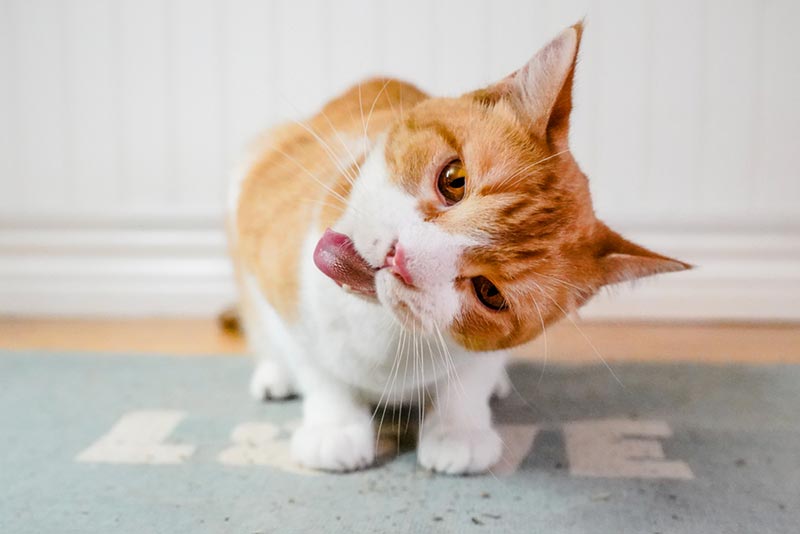
Cats are known for their mysterious behavior, and one of the most common behaviors they exhibit is head rubbing. As a cat owner, it’s normal to wonder why your feline friend rubs their head on you, the furniture, or even other animals. Is it a sign of affection, or is there something else going on? In this article, we’ll explore the various reasons why cats rub their heads up against things and why this behavior is significant.
The 5 Reasons Your Cat Rubs Their Head on You
1. Marking Their Territory
One of the main reasons why felines tend to rub their heads against things is to mark their territory. Cats have scent glands on various parts of their body, including their cheeks, forehead, and chin. When a cat rubs their head on something, they’re leaving their scent behind, which is a way of marking their territory.
This behavior is especially common in multi-cat households. Cats are naturally territorial animals, and they use scent marking as a way of establishing boundaries. By rubbing their heads on objects, they’re telling other cats that this space belongs to them. And in this case, yes, that means you!

2. Affection and Bonding
Another main reason why cats rub their heads on things is to show affection and bond with their owners. When a cat rubs their head on you, they’re not just leaving their scent behind, they’re also showing you that they trust you and feel safe around you.
This behavior is especially common in cats that have a close bond with their owners. So, if your cat rubs their head on you frequently, it’s a sign that they love you and enjoy your company. It’s also a way for them to strengthen their bond with you.
3. Seeking Attention
Cats are social animals, and they crave attention from their owners. When a cat rubs their head on you, they may be seeking attention or asking for affection. They may also be trying to communicate with you in some way.
If your cat is rubbing their head on you more than usual, it may be a sign that they’re feeling neglected or lonely. Make sure to give your cat plenty of attention and affection to help them feel loved and secure.

4. Relieving Stress and Anxiety
Felines are sensitive creatures, and they’re easily stressed or anxious. And when a cat is feeling stressed or anxious, they may rub their head on objects as a way of self-soothing.
This behavior is especially common in cats that are experiencing changes in their environment or routine. If you notice your cat rubbing their head on objects more than usual, it may be a sign that they’re feeling stressed or especially anxious. Try to identify the source of their stress and provide them with extra comfort and reassurance.
5. Sharing Their Scent
Being that felines are territorial animals; they often use scent marking as a way of communicating with other cats. When a cat rubs their head on objects, they’re leaving their scent behind, which is a way of communicating with other cats in the area.
This behavior is especially common in outdoor and stray cats, who use scent marking as a way of establishing their territory and communicating with other cats in the area. If you have an outdoor cat, you may notice that they rub their head on objects more frequently than indoor cats.

How to Respond to Your Cat’s Head Rubbing
If your cat is rubbing their head on you, it’s really important to respond appropriately. One way to respond is to pet your cat gently, which can help reinforce their bond with you. You can also talk to your cat in a soothing voice or offer them treats as a way of showing them affection.
And remember that if your cat is rubbing their head on objects excessively, it may be a sign that they’re feeling stressed or anxious. In this case, it’s best to try to identify the source of their stress and provide them with a bit of extra comfort and reassurance.
Frequently Asked Questions About Other “Weird” Behavior from Cats
Why Do Cats Purr?
One of the most mysterious and fascinating habits of cats is their ability to purr. From a soft and soothing sound to a loud and rumbling vibration, cats use their purrs to communicate a wide range of emotions. But what exactly is a purr, and why do cats do it?
Believe it or not, purring is not just a sign of contentment or sheer joy. Felines will also purr when they are feeling anxious, experience pain, or feel frightened. Researchers believe that purring is a way for cats to self-soothe and cope with stress. The vibrations produced by purring can have a calming effect on the cat’s nervous system, reducing their heart rate and blood pressure.
Purring can also be a form of communication between cats and their owners. When a cat purrs while being petted or cuddled, it’s a sign that they are enjoying the interaction and feel safe and secure. In this way, purring can be a way for cats to bond with their human companions.

Why Do Cats Climb and Perch?
One theory is that cats climb and perch as a way to survey their environment and keep watch over their territory. Being in a high place allows cats to observe their surroundings and detect potential threats. It can also give them a sense of security and protection, as they have a clear view of their surroundings and can easily escape danger if necessary.
Climbing and perching can also be a form of exercise and stimulation for cats. It allows them to use their natural hunting instincts and practice their agility and coordination. For indoor cats, providing high places to climb and perch can be a way to satisfy their natural instincts and prevent boredom and lethargy.
Why Do Cats Suddenly Run Around a Room?
This behavior involves cats running around in a frenzied and erratic manner, often accompanied by jumping and playfulness. But why do cats do this, and what is the purpose behind it? Often referred to as “zoomies”, zoomies are a natural instinct for cats and are often a way for them to release pent-up energy and express their playful side. It can also be a way for cats to practice their hunting skills and agility, as they run, jump, and pounce on imaginary prey.
Zoomies can also be triggered by external stimuli, such as a sudden noise or movement. In this case, cats may be reacting to a perceived threat or simply reacting to their environment. Whatever the reason, zoomies are a source of entertainment and amusement for cat owners and a reminder of the playful and unpredictable nature of cats.
Why Do Cats Love Kneading Things?
Another endearing habit of cats is their tendency to knead, also known as “making biscuits.” This behavior involves the cat pushing its paws in and out against a soft surface, such as a blanket or a lap. But why do cats knead, and what does it mean?
Kneading is a natural instinct for cats that starts when they are kittens. Nursing kittens knead their mother’s belly to stimulate milk production and show affection. Adult cats continue to knead as a way to show love and affection to their owners. It’s also a way for cats to mark their territory, as the scent glands in their paws leave their scent on the surface they are kneading.
Kneading can also be a sign of relaxation and contentment. When a cat is kneading, they are releasing endorphins that have a calming effect on their body. As such, kneading can be a way for cats to de-stress and unwind after a busy day.
Why Do Cats Go Crazy for Catnip?
Catnip is a plant that contains a chemical called nepetalactone. When cats smell or ingest this chemical, it triggers a response in their brain that produces a euphoric and stimulating effect. Not all cats react to catnip, and those that do have a genetic predisposition to it.
The effects of catnip on cats can vary, with some becoming hyperactive and others becoming relaxed and mellow. The response to catnip can also depend on the individual cat’s mood and environment. While catnip is harmless to cats and can be a source of entertainment, it’s important to use it in moderation, as some cats may become aggressive or overly excited when exposed to it.

Why Do Cats Love Hopping Inside of Boxes?
There are several theories behind this behavior. One is that boxes provide cats with a sense of security and protection. Being in a confined space allows cats to feel safe and hidden from potential threats. Another theory is that boxes provide cats with a way to regulate their body temperature. Being in a small, enclosed space can help cats conserve body heat, especially in colder environments.
Boxes can also be a source of entertainment and stimulation for cats. They can use boxes as a hiding place, a launching pad for surprise attacks, or a place to observe their surroundings from a safe distance. Whatever the reason, it’s clear that cats have a special affinity for boxes and will go to great lengths to claim one as their own.
Why Does My Cat Love Bringing Gifts?
One theory is that cats see their owners as part of their social group and are bringing them food as a way to share their bounty. Another theory is that cats are trying to teach their owners how to hunt, as they would with their kittens. Bringing prey to their owners could also be a way for cats to seek approval and affection, as they are offering a valuable gift to their human companion.
While the sight of a dead animal may be unsettling to some humans, it’s important to understand that this behavior is a natural instinct for cats. It’s also a way for them to express their love and loyalty to their owners, in a way that may seem strange to us but is deeply meaningful to them.
Why Do Cats Love to Stare at You?
One interpretation is that the cat is trying to assert dominance or establish territory. Cats are territorial animals and may use their stare as a way to show their dominance over other cats or humans. Another interpretation is that the cat is trying to communicate a need or desire, such as hunger or the need for attention. By staring at their owner, cats may be trying to convey a message or request.
It’s helpful to pay attention to your cat’s body language when interpreting their stare. If their ears are pinned back or their tail is twitching, it may be a sign of aggression or discomfort. If they are relaxed and purring, it’s likely that they are happy and content.
Wrapping Things Up
Head rubbing is a natural behavior that cats engage in for a variety of reasons. Whether they’re marking their territory, showing affection, seeking attention, relieving stress, or sharing their scent, head rubbing is a significant part of feline behavior and isn’t done with bad intentions. Also, by understanding the reasons behind head rubbing behavior, you can deepen your bond with your feline friend and provide them with the love and care they need.
Featured Image Credit: Irina Kozorog, Shutterstock






